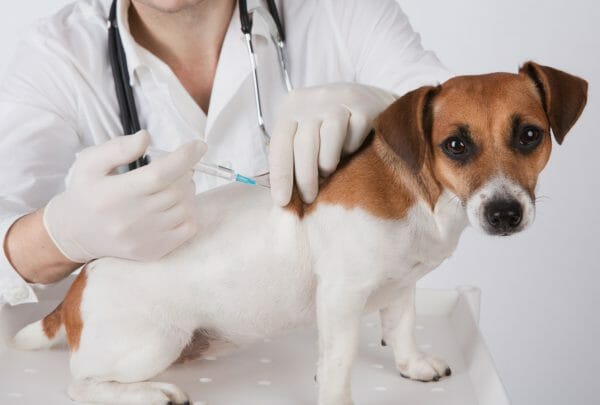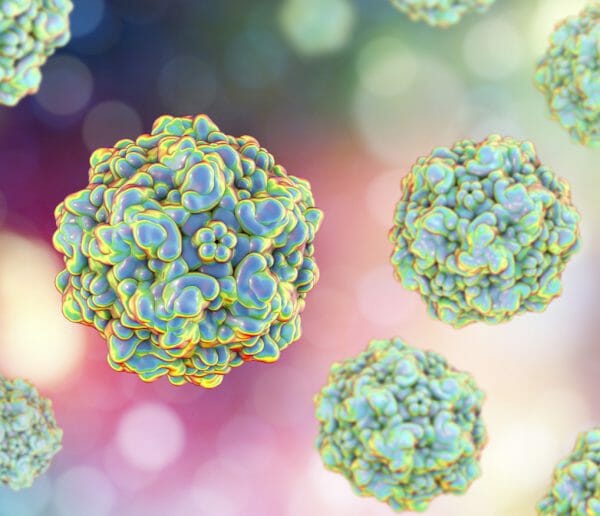What Is Parvo?
In cases of type 2 canine parvovirus (CPV), or parvo, a puppy that is rambunctious and energetic can quickly become very sick and weak in a matter of days. Parvo in dogs is a condition that is most frequently found in puppies, but it can appear in dogs of any age. Parvo is an extremely contagious and vicious viral infection of the intestines or stomach that can turn deadly if left untreated.
If treated aggressively, the mortality rate drops from 90% to between 5% and 20%. For this reason, parvo in puppies is not something to take lightly or ignore. If a dog is showing symptoms of parvo, it should be considered an emergency that a vet needs to evaluate and treat as soon as possible.
A puppy between the ages of 6 weeks and 6 months should be under close observance for parvo signs, given that this is the prime age when they can contract it. Puppies younger than this are usually protected through the nutrients in the milk of the mother. However, this is only the case if the mother had received her parvo vaccines before conceiving.
Puppies must receive three full rounds of parvo vaccinations before they are fully protected. These vaccinations should occur at 6, 8, and 12 weeks following birth.

The parvovirus is most prevalent in the following breeds:
- Rottweilers
- Labrador Retrievers
- English Springer Spaniels
- Pit Bulls
- German Shepherds
- Doberman Pinschers
Puppies belonging to these breeds in particular should be monitored until all vaccinations are given.

How Do Dogs Get Parvo?
Parvo in dogs can occur any number of ways, but the most common way is through direct contact with an infected dog or by sniffing, licking, or eating substances that are contaminated with the virus.

The high transmissibility of parvovirus makes it exceedingly difficult to contain. Even infected stool particles on shoes or dog fur is potent enough to infect other dogs. The parvovirus itself is also able to withstand extreme weather conditions, including blistering heat or freezing cold. Some studies have confirmed that the virus can remain alive and well in dirt up to one year.
For these reasons, if a dog is infected with parvovirus, it should be immediately quarantined from other pets in the house. The canine’s vet should be made aware of the situation at once. A vet will both be able to properly care for the dog and recommend how the other pets can be kept safe from the virus.
In general, if a puppy is infected with parvo, the living space where it has played and slept should be meticulously cleaned and sanitized. Bleach is one of the only cleaning agents capable of eradicating the parvovirus. All affected objects should be disposed of.
If a puppy is adopted from a dog shelter, it is strongly suggested that the puppy be vaccinated again for parvo, even if it has already received the vaccinations. This is due to the fact that places like kennels, which have high concentrations of dogs living in close proximity, are perfect breeding environments for the parvovirus to grow and spread. After all, it is better to be safe than sorry when it comes to this virulent virus.
Signs of Parvo in Dogs
Once a puppy comes into contact with the virus, the parvo symptoms tend to appear 3 to 10 days later. These symptoms are serious and unmistakable. Even if parvo is not suspected, a dog should be taken to the vet if any of these symptoms arise quickly and in tandem:
- Upset stomach, often resulting in vomiting
- Bloody stool or diarrhea
- Weakness or a major decrease in activity
- Rapid loss of weight
- High fever or hypothermia
- Dehydration (Canine Coronavirus has similar symptoms)
Parvo symptoms in puppies are critical indications that the puppy should be seen by a vet immediately. The immune systems of young puppies tend to be weak and vulnerable, so the virus can inflict serious damage to the health of the puppies in a short amount of time. Infection, sepsis, and anemia are all possible in dogs with the intestinal manifestation of parvo that are left untreated for too long.

Treatment of Parvo
Concerning the treatment methods of parvo in dogs, the sooner the dog is diagnosed and treated, the better chances it has for survival. Time is of the essence with the parvovirus. Dogs that have a poor immune systems, such as very young or very old dogs, are the least likely to recover from parvovirus.
Once the diagnosis has been made based on the parvo signs in a dog and other diagnostic tests, some of the following treatment approaches will be utilized by a vet.
- Due to the low fluid levels and dehydration that can occur, a canine with parvovirus will usually need to be hospitalized for a few days and hooked up to an IV to replenish the lost nutrients and stabilize its fluid levels.
- Antiemetics, antidiarrheal, and strong antibiotics may be given to curb the vomiting and diarrhea as well as combat the viral infection present.
The dog will be kept under careful observation by the vet throughout parvo treatment. It is important to remember that there is no single cure for the virus itself. Only the symptoms can be treated and dealt with as they arise. Luckily, dogs treated in an animal hospital have a more than 70% survival rate.

Can Cats Get Parvo?
Just like dogs, cats also are vulnerable to the parvovirus. However, in felines case, it goes by the name feline panleukopenia virus (FPV). The parvo signs that are found in cats closely resemble those in found in their canine counterparts.
In cats, especially those that have compromised immunity, FPV is extremely deadly. Cats that are pregnant or those kittens that are 2 to 6 months old are frequent victims of the rampant virus.
Parvo in Humans
Although humans are capable of contracting parvo, it is experienced to a much lesser degree in terms of severity. It is often contracted during childhood from one child to another.
Lasting only about a week in duration, people with parvo tend to experience minor symptoms that resemble the common cold. Achiness, fatigue, and a fever are common signs of human parvovirus. Because of its insignificance as a virus in terms of severity, there are no needed vaccinations for parvo in humans.



